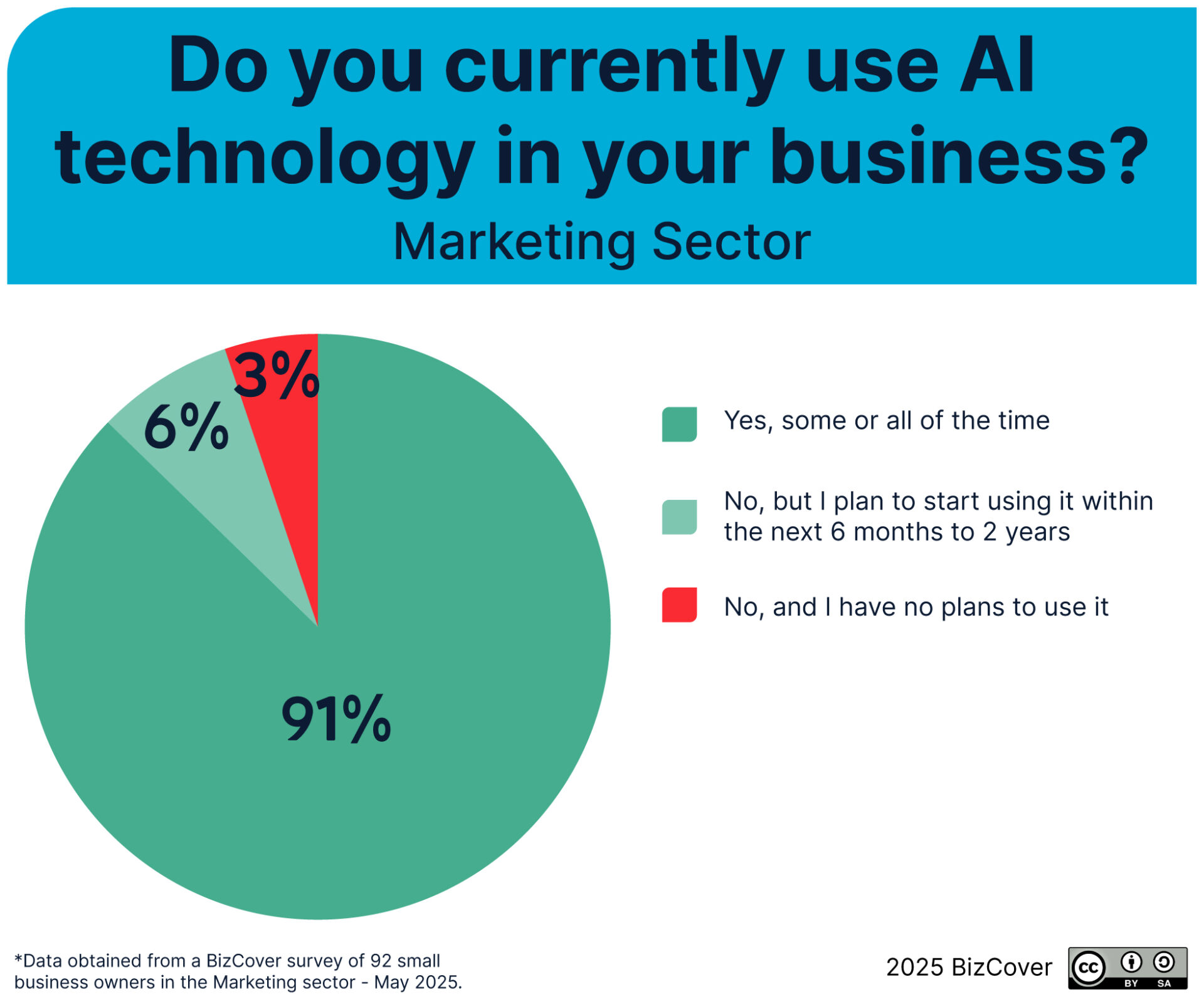How Marketing Businesses Are Adapting to AI in 2025
How has the rapid rise of AI impacted your small business? To better understand how Aussie small businesses are using AI (or planning to use AI in the future), BizCover conducted The Australian Small Business AI Report 2025 by surveying 965 businesses.
Among the most enthusiastic adopters of AI is the marketing sector. Of those surveyed in the report, 92 marketing businesses revealed how deeply AI has become embedded in their processes and how it’s changing the way they work.
Sharon Kenny, BizCover’s Head of Marketing, has spent more than a decade leading campaigns and strategy in the insuretech space. As a marketing leader, she has a front-row view of how AI is influencing creativity, hiring and the future of work in this fast-moving field.
The below report details findings from 92 businesses in the marketing sector, giving a rounded view on their stance towards AI, alongside commentary from Sharon Kenny.
Key takeaways
- Highest AI adoption rate: 91% of marketing businesses currently use AI technology, with 97% either using or planning to adopt it the highest adoption rate among all sectors surveyed.
- Deep integration of AI in daily operations: 87% of marketers rate AI as important or very important to their day-to-day work, reflecting AI’s embedded role across activities like content creation, campaign optimisation, and customer engagement.
- Balanced optimism on AI’s impact: While 55% expect AI to significantly boost efficiency and productivity, 29% view AI primarily as a tool to enhance existing services rather than radically disrupt the marketing sector.
- Skills challenges and evolution: 77% of marketers report difficulty finding skilled professionals, especially in data analysis and content creation, while 59% expect AI to create demand for new skills within 3–5 years, signalling a rapidly evolving workforce
- Task vs. role replacement outlook: 54% believe AI can replace specific marketing tasks but not entire job roles, with 52% willing to consider AI tools over hiring or outsourcing, highlighting AI as a partner to human creativity rather than a full replacement.
AI adoption in the marketing sector: Current usage and trends
The marketing industry is leading the charge when it comes to AI adoption among Australian small businesses. 91% of marketing businesses surveyed in the report already use AI, with another 6% planning to adopt it within the next two years. That leaves just 3% with no plans to use AI – the lowest level of resistance across all industries surveyed.
The technology has become deeply embedded in everyday workflows, with 87% of marketing business owners say AI is important to their day-to-day operations.
When asked about the future impact of AI, 55% of marketers believe it will significantly improve efficiency and productivity, while 29% see it as a way to enhance their existing services. This shows that while marketers are confident in AI’s abilities to optimise marketing functions, many marketers see it primarily as a supportive tool rather than a radical industry disruptor.
“In my experience, marketers are often early adopters of new tech and AI is no exception,” says Kenny. “What stands out from these statistics is not just how many are using AI, but how central it’s become to how they operate. AI is helping marketing teams work smarter and move faster.”

How are marketing businesses using AI?
The most common tasks AI is used for within the marketing sector are:
- Marketing, content creation and copywriting.
- Client and external communications (such as email writing, proposals and outreach).
- Problem-solving and AI assistance (such as guidance/decision-making, ideation and research).
These uses show how quickly AI has become a necessary part of everyday for marketers. From campaign optimisation and customer segmentation to social media scheduling, automated reporting,and AI-powered customer service, AI technology is becoming a quintessential part of marketing daily operations.
“Marketing professionals are utilising AI to support a broad spectrum of tasks,” says Kenny. “We’re seeing AI used to not only speed things up, but also to help marketers get better results through personalisation and data-driven decisions.”

Current barriers to AI adoption in marketing
Despite high adoption rates, a small portion of marketers still hold back from fully integrating AI. The top three barriers are:
- Not sure how AI works or how to use it.
- Concerns about accuracy or reliability.
- Waiting to see how AI develops before implementing.
These insights reveal that the hesitation is less about fear and more about practicality. Some marketers are holding off until they better understand how to apply AI to their unique workflows, while others are watching closely to see how the technology evolves and matures.

AI’s importance to daily operations in marketing
A massive 87% of marketing respondents consider AI important to their day-to-day operations. This is the highest proportion across all sectors surveyed.
This high figure reflects how central AI has become to key marketing functions such as content creation, campaign optimisation, data analysis and customer engagement. Whether it’s drafting email campaigns, generating insights from audience behaviour, or automating routine tasks, AI is enabling marketers to do more with greater speed and precision.
“There’s no going back for the marketing sector,” says Kenny. “AI has firmly established itself as a core part of marketing workflows.”
However, 13% of marketing businesses still view AI as less important or not important at all. This minority may represent businesses that are still in early adoption stages, or those whose strategies rely more on traditional methods and human-led creativity.
“Even in a fast-moving industry like marketing, it’s natural to see some variation in how quickly businesses integrate new tools,” continues Kenny. “That said, businesses that don’t embrace AI risk falling behind in such an agile and competitive landscape.”

What impact will AI have on marketing skills?
The marketing industry is preparing for a significant skills transformation driven by AI. Nearly 6 in 10 marketers (59%) expect AI to create demand for entirely new skills within the next 3–5 years, while 48% believe it will reduce the need for some current skills. Only 4% expect no change at all.
“These numbers reflect what we’re seeing every day in the industry,” says Kenny. “AI is reshaping what it means to be a marketer in a competitive industry, and skillsets need to evolve to keep pace.”
The expected AI-driven skills trasnformation is perhaps influenced by the fact that many (77%) small marketing businesses say it’s hard to find professionals with hard skills (technical skills and knowledge needed for a specific job) or soft skills (interpersonal skills that are non-job specific), or both. Of that number, 26% report difficulty sourcing hard skills like data analysis or coding, and 24% struggle to find soft skills such as communication and leadership. Only 23% say they have no difficulty finding skilled talent.
Upskilling to stay competitive in the marketing sector
To stay ahead in a rapidly changing industry, many marketers are actively developing new capabilities. The top areas of upskilling include creativity and innovation (41%), AI, automation and data analytics (37%), and communication (32%). This proactive development shows the industry’s readiness to evolve alongside technology.
Marketers are optimistic about the benefits of AI in key creative and strategic areas. 54% believe AI will enhance creativity and innovation, while 53% think it will improve copywriting and content creation – despite both being heavily impacted by automation.
“There’s a lot of talk about AI replacing creativity, but marketers clearly don’t see it that way,” Kenny says. “They’re using AI as a springboard for ideas, not a substitute for original thinking.”
However, there are some concerns. Interpersonal and social skills are expected to decline, with 39% predicting a drop and only 27% expecting improvement. This indicates a potential challenge in maintaining strong human relationships and emotional intelligence in an AI-enhanced environment.
Could marketers be replaced with AI?
AI adoption within the marketing industry has now become well and truly embedded. However, marketers are taking a measured approach as to what it can, and should, replace.
73% of marketers believe AI could take over some aspect of work in their business, but few see it as a total substitute for people. Over half (54%) say AI could replace certain tasks but not entire job roles, while 15% believe it could replace both tasks and full roles. Only 4% think AI could fully replace job roles on its own.
This task-focused mindset also seems to be influencing hiring decisions. 52% of marketing professionals say they would consider using AI instead of hiring or outsourcing, reflecting a shift toward automation for content creation, reporting, data analysis, and customer service. Of that group, 16% would actively choose AI over a person, while 36% would consider it only in certain scenarios.
“These numbers point to a balanced view,” says Kenny. “Marketers are clearly comfortable using AI technology to streamline workflows and reduce repetitive manual tasks; but when it comes to creative direction and strategic thinking, human creativity still wins out.”

What roles could AI replace in marketing?
As AI tools become more advanced and widely adopted, some marketing roles are seen as more vulnerable to automation than others.
According to the report, the roles most commonly identified as replaceable by AI are content writers and copywriters, followed closely by social media managers.
These roles largely involve content creation, data analysis, and campaign management tasks, areas where AI tools are increasingly applied.
“This highlights a complex dynamic in marketing. While AI is expected to automate certain aspects of content writing and copywriting, these roles fundamentally rely on human creativity and strategic insight that AI cannot fully replicate,” says Kenny.

How do marketers feel about AI’s future impact on the sector?
Marketing professionals are showing strong optimism about AI’s potential. Three in four (75%) feel positive about AI’s impact on their skills and career, with 43% anticipating significant opportunities to grow and adapt as technology evolves.
Only a small proportion remain cautious: 13% are neutral, expecting little change, and 12% express concern about staying relevant or experiencing skill obsolescence. While not insignificant, these figures are notably lower than in other sectors, reinforcing marketing’s early embrace of AI.
“Marketers are among the most proactive in turning AI into an opportunity,” says Sharon Kenny. “They’re using it to amplify ideas, not replace them, keeping human creativity at the core.”

Conclusion: Marketers embrace AI, but are drawing clear boundaries
Compared to other industries in the BizCover survey, marketing is far and away the industry that has embraced AI the most. For small marketing businesses, AI is not just a trend. It’s already embedded in their day-to-operations, driving efficiency and streamlining processes across the marketing funnel.
However, marketers are drawing clear boundaries between tasks that can be automated and the irreplaceable human skills that are needed to bring a marketing campaign to life. Creativity, strategic thinking, leadership and brand storytelling continue to be seen as core strengths that set businesses apart. These skills cannot be automated by a machine.
Overall, small marketing businesses remain highly optimistic about AI’s role, viewing it as a powerful enabler that boosts productivity, enhances personalisation and helps drive innovation.
Need help navigating the digital shift or protecting your marketing business? At BizCover, we make it quick and easy to compare business insurance quotes online. For on the go cover, go BizCover.
Find more data from small businesses across all sectors in The Australian Small Business AI Report 2025.
Methodology
This research was conducted via an online survey distributed to Australian business owners in April 2025. A total of 1,323 responses were collected. For the purposes of this analysis, only responses from small business owners (defined as those with 20 or fewer employees) were included, bringing the final sample size to 965.
These respondents represented seven industries, after excluding two industries with low response rates (fewer than 50 responses each) to ensure meaningful comparison. The remaining industries include Marketing and Communications, Consulting and Strategy, ICT, Healthcare and Medical, and others. There were 92 respondents from the Marketing sector.
Respondents were asked a mix of multiple choice and checkbox questions covering AI adoption, its impact on operations and roles, and evolving skill requirements. The data has been analysed to highlight trends across small business owners, industries, and anticipated future use of AI in the small business sector.
© 2025 BizCover Pty Limited, all rights reserved. ABN 68 127 707 975; AFSL 501769
This information is general only and does not take into account your objectives, financial situation or needs. It should not be relied upon as advice. As with any insurance, cover will be subject to the terms, conditions and exclusions contained in the policy wording or Product Disclosure Statement (available on our website). Please consider whether the advice is suitable for you before proceeding with any purchase. Target Market Determination document is also available (as applicable). © 2026 BizCover Pty Limited, all rights reserved. ABN 68 127 707 975; AFSL 501769.



